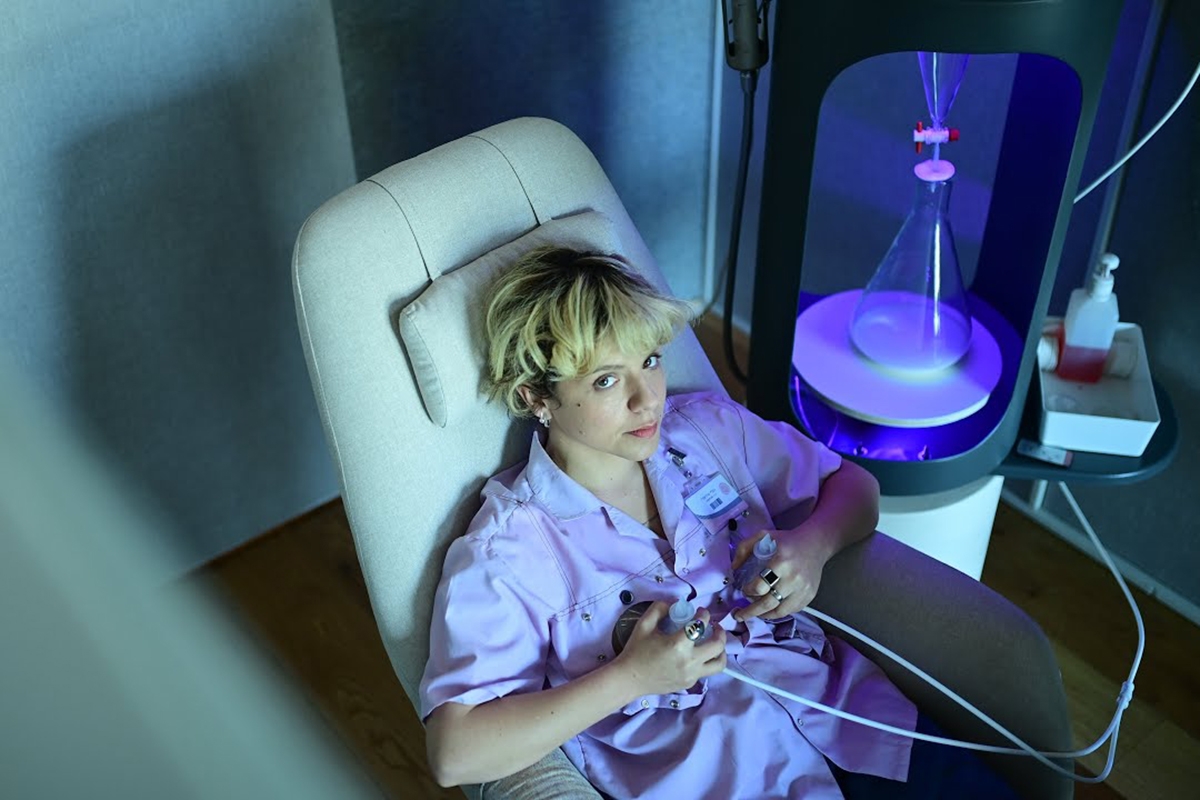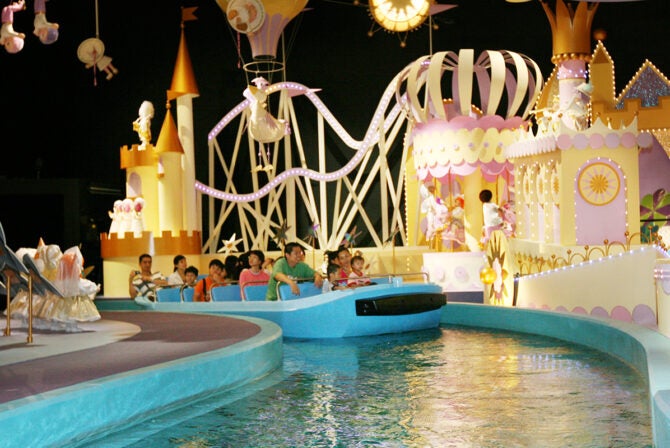As we chat, Israeli director Maya Kenig wonders why it is that her dystopian movie “The Milky Way,” about a new single mom who works for a company that sells breastmilk to affluent parents, is, well, dystopian.
Kenig was surprised at first to discover that there was no movie with a similar premise, and then as she researched, she was surprised even more that while there are places that sell breastmilk to mothers, like the website Only the Breast, there aren’t any companies marketing it as a bespoke, “fair-trade,” organic product.
The vision for this film, which recently screened at the Israel Film Center Festival in Manhattan, arrived to Kenig one day as she was, herself, pumping in the office. “What a strange act it is to pump milk with a machine,” the veteran TV editor thought to herself. As the idea started formulating, Kenig realized it was the kind of movie she really wanted to see herself.
It’s been a year and a half since I last nursed a child, but those early days of hazy parenting are still ones I feel so viscerally, and the film feels deeply resonant to me. When we meet our protagonist, a musician named Tala, played by singer Hila Ruach, she’s onstage singing to a dwindling crowd at an indie concert venue with a heavily pregnant belly. We then see her no longer pregnant, but interviewing for a job at a company called The Milky Way.
Ruach is transcendent and haunting in her acting debut. Kenig cast her because she knew she wanted the movie’s protagonist to be an actual musician, and the movie incorporates her music — sultry and haunting songs of streams of consciousness that borrow from her lived experiences. As Tala sits in the waiting room of The Milky Way, she sees a poem by Polish poet Wisława Szymborska about Vermeer’s “The Milkmaid,” and those words become a song that Tala sings to herself, slowly molding into form as the movie progresses. “So long as that woman,” Tala sings and hums to herself, “keeps pouring milk day after day.” It brings to mind the often invisible, unspoken female labor that is nursing and childrearing. The image of a woman nursing is often depicted as an angelic sort of matriarch, sacrificing her very lifeblood with complete serenity and devotion to feed her new child.
The father of Tala’s newborn, Sheleg (Hebrew for snow), is not in the picture. She lives with her mother, who sometimes helps take care of the child. At work in The Milky Way, Tala pumps while her daughter is taken care of in a bright and well-equipped nursery, both colorful and muted enough to perfectly fit the best of the Instagram mom influencer aesthetic. The women shuttle in and change into pastel pink nursing shirts that look a little like a nurse’s uniform. Each woman pumps in her own cubby, in a comfortable seat with a window to an idyllic verdant landscape, while she listens to an instructional video, which Tala compares to an airplane safety clip. The pump’s rhythmic humming is similar to the static-y sound of the air mid-flight, as the milk slowly drips into a pristine glass beaker. Tala is told to sit back, relax and let nature take its course, looking out at the perfect beauty outside of the window while shackled to a machine.
The imagery of being on an airplane is apt. Going to work after giving birth at times feels like entering a different time and space; food tastes different, time feels different, you’re disconnected from the ground, and from this being that needs you, and for some, your literal body, for sustenance. Tala is only a few rooms away from her daughter, but the distance feels much greater. She struggles with her new identity as a mother, having solely thought of herself as a musician until this point. And yet in “The Milky Way,” motherhood is not a death sentence to creativity. Tala finds a song hidden in the hum of the breast pump.
Who is it that gets her liquid gold? Tala soon discovers it’s Nili, played by “Shtisel” and “We Were the Lucky Ones” star Hadas Yaron. She is, at least in appearance, the polar opposite of Tala. Rich, married, someone who has access to not just Tala’s milk, but to live-in childcare, with a pampered life in a large villa with a pool. But the two find a strange connection, as Tala does with all the other women working in the factory — young mothers, older mothers, religious, secular.
It was meeting with women like Nili that inspired Kenig to make this movie. She noticed that they were getting all the best products for their babies — the fanciest strollers and cribs, the softest and priciest clothes — and yet most of the more affluent first-time mothers she met were happy to give their kids formula. “If [breast milk] would be marketed properly and not as bodily fluids, I think they would have gone for it,” she tells me.
The idea of a breastmilk factory might seem dystopic, but as Kenig illuminates in this film, it’s not so different from the reality for nursing mothers, and mothers in general. If we’re lucky, we can go to work to make money to pay for other people to take care of our kids, and those people are sometimes taking care of our kids at the expense of theirs, like Nili’s foreign worker nanny, who is so wonderful with her newborn son, but walks around with a necklace carrying the likeness of her own child, likely oceans away. The women who work at the Milky Way have to give up nursing their own kids — the center even supplies them with formula — but then again, many women don’t have the luxury to breastfeed or even pump because of their jobs and socioeconomic class.
Yet this movie doesn’t villainize anyone. Nili, like Tala, is trapped by her class — but the misery and heaviness of early parenthood weighs heavy on them both. These two women give such a soulful performance of the crushing weight of those first few months and even years of being a parent, the constant feeling of being needed, the ever-looming sense of failure, the inability to meet that perfect image of motherhood, to supply a helpless infant with what they feel a good mom should: for Tala, it’s a roof over their head and stability; for Nili, it’s breastmilk. Both struggle to really connect with the enormity of suddenly being a parent.
“The nursing is just the metaphor for the whole existence of being a mom,” Kenig says. “You don’t feel this perfect feeling you’re supposed to feel. You’re not this perfect person you’re supposed to be.”
The movie is full of Israeli specificities, but still its premise, and the social and economic dynamics it portrays, are very universal. I’ve rarely seen a movie that centers breastfeeding and early motherhood in such a masterful way.
Interestingly, Yaron, Ruach and most of the actresses in “The Milky Way” are not mothers. Kenig had wondered if that should be a consideration in casting her film, but in the end, decided against it. Instead, the movie serves as a bit of a strange and maybe foreboding preview of childrearing for much of its cast.
“The Milky Way” is dark, but it is also tender, and generous to all its female characters. Even though my days of early parenthood were haunting and hard, I didn’t find myself triggered, only seen, even embraced, by this film. It’s a reminder of the camaraderie all women share in motherhood and of the meaning and magic that parenthood, even in all its mundanities, still infuses into our lives.








